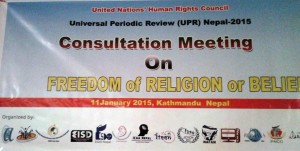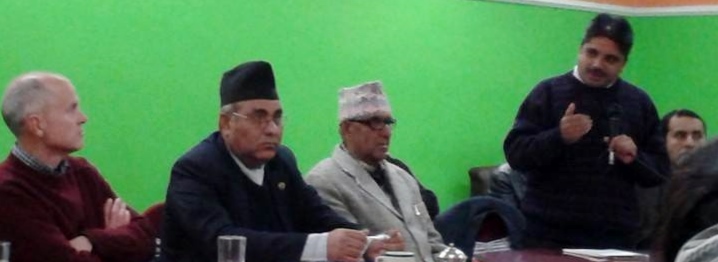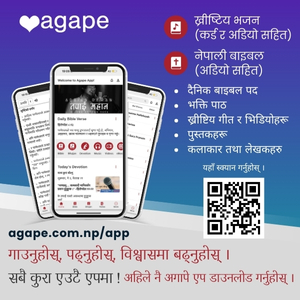Prakash Khadka,
11 Jan 2015|Kathmandu, Nepal

More than forty religious leaders from (Hindu, Christian and Bahai), media person, educators and organizational leaders have expressed their concerns about policy and legal provision regarding religious freedom in Nepal.
Rights to freedom of practice of religious minority are challenged due to the wider cultural practice based on religious majority.
‘Art and cultural are constraints of religious rights’ said Mr. Lok Mani Dhakal; a member of Constitutional Assembly. “Republic system itself is not in favour of minority because of two third voting provisions”- he added.
Mr. Raju Pradhan, a Nepali Christian professional made a paper presentation about the religious issues and constitutional/legal provision for freedom of belief and practice.
Mr. Pradhan focused that 23rd clause of the Interim Constitution of Nepal-2007 is double standard as it guarantees the religious freedom at the same time limits freedom of choice which mentioned as: Every person shall have the freedom to profess and practice his own religion as handed down to him from ancient times having due regard to traditional practices.
 Important concern is; when a child grow up to a certain level of maturity, s/he should have freedom of choice of choosing or not choosing belief disregarding what has been handed down from ancient times.
Important concern is; when a child grow up to a certain level of maturity, s/he should have freedom of choice of choosing or not choosing belief disregarding what has been handed down from ancient times. Group of participant also discussed some cases of difficulties when some of the government agencies conduct mass practices of Hindu custom mandatory for all; disregarding individual faith.
 According to Mr. Narendra Pandry, a member of interreligious council of Nepal from Bahai faith, Burial grounds, legality on religious property and government recognition of vital registrations in religious institution are still major concerns while talking about religious rights and identities. His team is preparing a shadow reports on the issues of minority rights.
According to Mr. Narendra Pandry, a member of interreligious council of Nepal from Bahai faith, Burial grounds, legality on religious property and government recognition of vital registrations in religious institution are still major concerns while talking about religious rights and identities. His team is preparing a shadow reports on the issues of minority rights. In other hand, non-Hindus are not allowed in Pashupati: a famous Hindu shrine while it collects millions of fund from thousands of non Hindu tourist every month- Said Ms. Debaki Acharya who is a Hindu by faith, Student at Tribhuvan University and leader of civil society organization. “How can be a public religious place banned for people from certain faith?”- She questioned.
However, demanding rights as religious minority should be accompanied by fulfilment of civil duties. Some of the Christian leaders during the discussion emphasizes that legal provision of punishment for killing cow is right and just as it is a National Animal in Nepal. One should not make it issues of religious freedom and therefore protect its national identity.
“But only legal provision is not enough; perspective of people has to be changed and constructive role of media is imperative for changing such perspective”- the parliamentarian added.
Nevertheless, religious rights are not only for minority religion, this should be equally enjoyable by religious majority too.
Nepal looks forward long waited new constitution as deadline of constitution assembly is 23rd Jan mandated by second election of constitution assembly in 2013. First election of constitution assembly was held in 2008 which was dissolved in 2012 without promulgating new constitution even after extending its mandate frequently. In other hand Nepal is going through second cycle of Universal Periodic Review (UPR) under Human Rights Council of United Nations in November 2015. END






















Discussion about this post